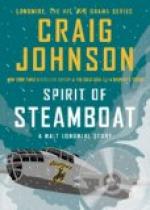The moment they were fairly buried in the water, the old man clasped his hands together, and said, “Blessed be the tide that will break over and bury ye forever! Sad to mariners, and sorrowful to maids and mothers, has the time been you have choked up this deep and bonnie bay. For evil were you sent, and for evil have you continued. Every season finds from you its song of sorrow and wail, its funeral processions, and its shrouded corses. Woe to the land where the wood grew that made ye! Cursed be the axe that hewed ye on the mountains, the hands that joined ye together, the bay that ye first swam in, and the wind that wafted ye here! Seven times have ye put my life in peril, three fair sons have you swept from my side, and two bonnie grand-bairns; and now, even now, your waters foam and flash for my destruction, did I venture my infirm limbs in quest of food in your deadly bay. I see by that ripple and that foam, and hear by the sound and singing of your surge, that ye yearn for another victim; but it shall not be me nor mine.”
Even as the old mariner addressed himself to the wrecked ships, a young man appeared at the southern extremity of the bay, holding his halve-net in his hand, and hastening into the current. Mark rose, and shouted, and waved him back from a place which, to a person unacquainted with the dangers of the bay, real and superstitious, seemed sufficiently perilous: his grand-daughter, too, added her voice to his, and waved her white hands; but the more they strove, the faster advanced the peasant, till he stood to his middle in the water, while the tide increased every moment in depth and strength. “Andrew, Andrew,” cried the young woman, in a voice quavering with emotion, “turn, turn, I tell you: O the ships, the Haunted Ships!” But the appearance of a fine run of fish had more influence with the peasant than the voice of bonnie Barbara, and forward he dashed, net in hand. In a moment he was borne off his feet, and mingled like foam with the water, and hurried toward the fatal eddies which whirled and roared round the sunken ships. But he was a powerful young man, and an expert swimmer: he seized on one of the projecting ribs of the nearest hulk, and clinging to it with the grasp of despair, uttered yell after yell, sustaining himself against the prodigious rush of the current.
From a shealing of turf and straw, within the pitch of a bar from the spot where we stood, came out an old woman bent with age, and leaning on a crutch. “I heard the voice of that lad Andrew Lammie; can the chield be drowning, that he skirls sae uncannilie?” said the old woman, seating herself on the ground, and looking earnestly at the water. “Ou aye,” she continued, “he’s doomed, he’s doomed; heart and hand can never save him; boats, ropes, and man’s strength, and wit, all vain! vain! he’s doomed, he’s doomed!”




